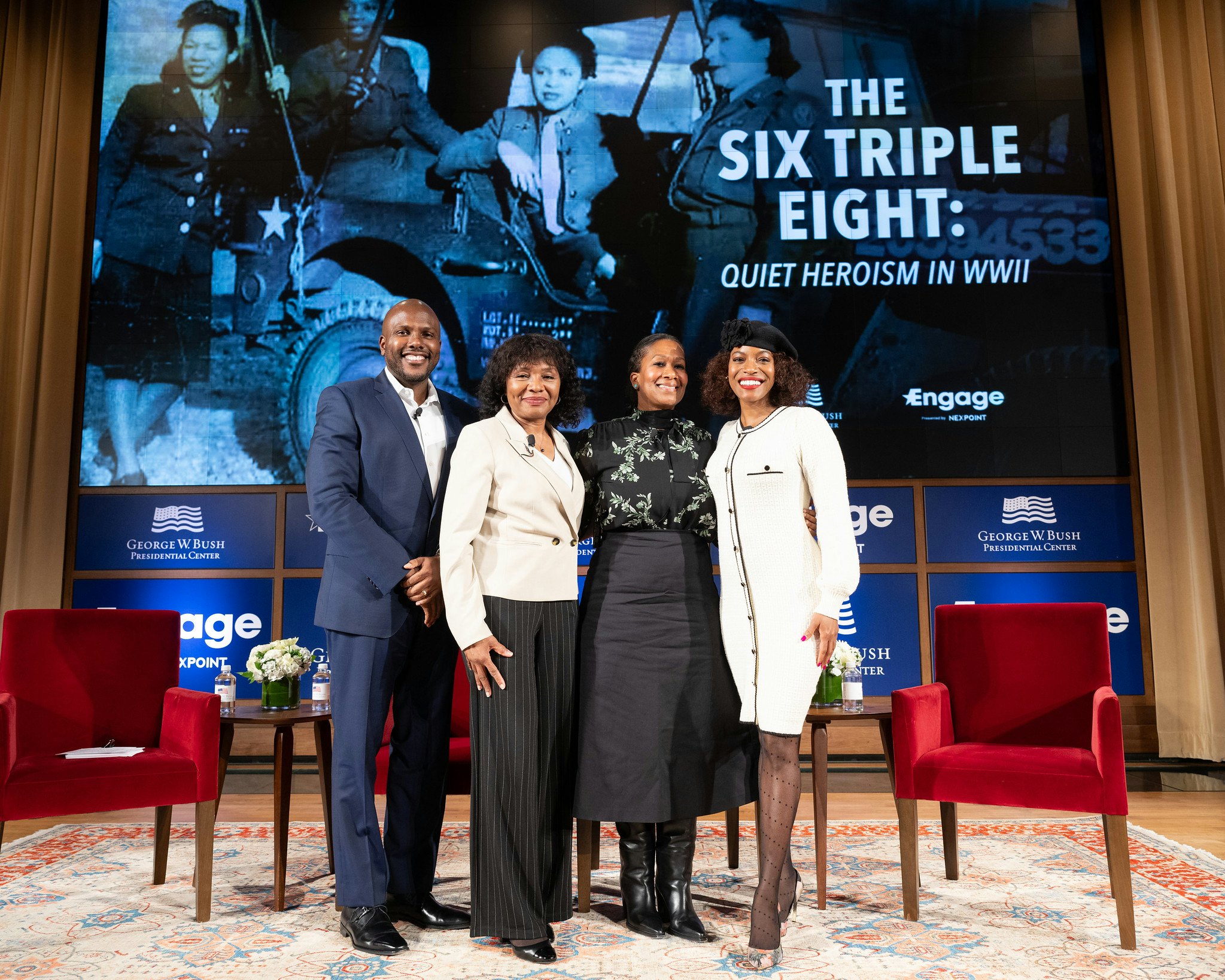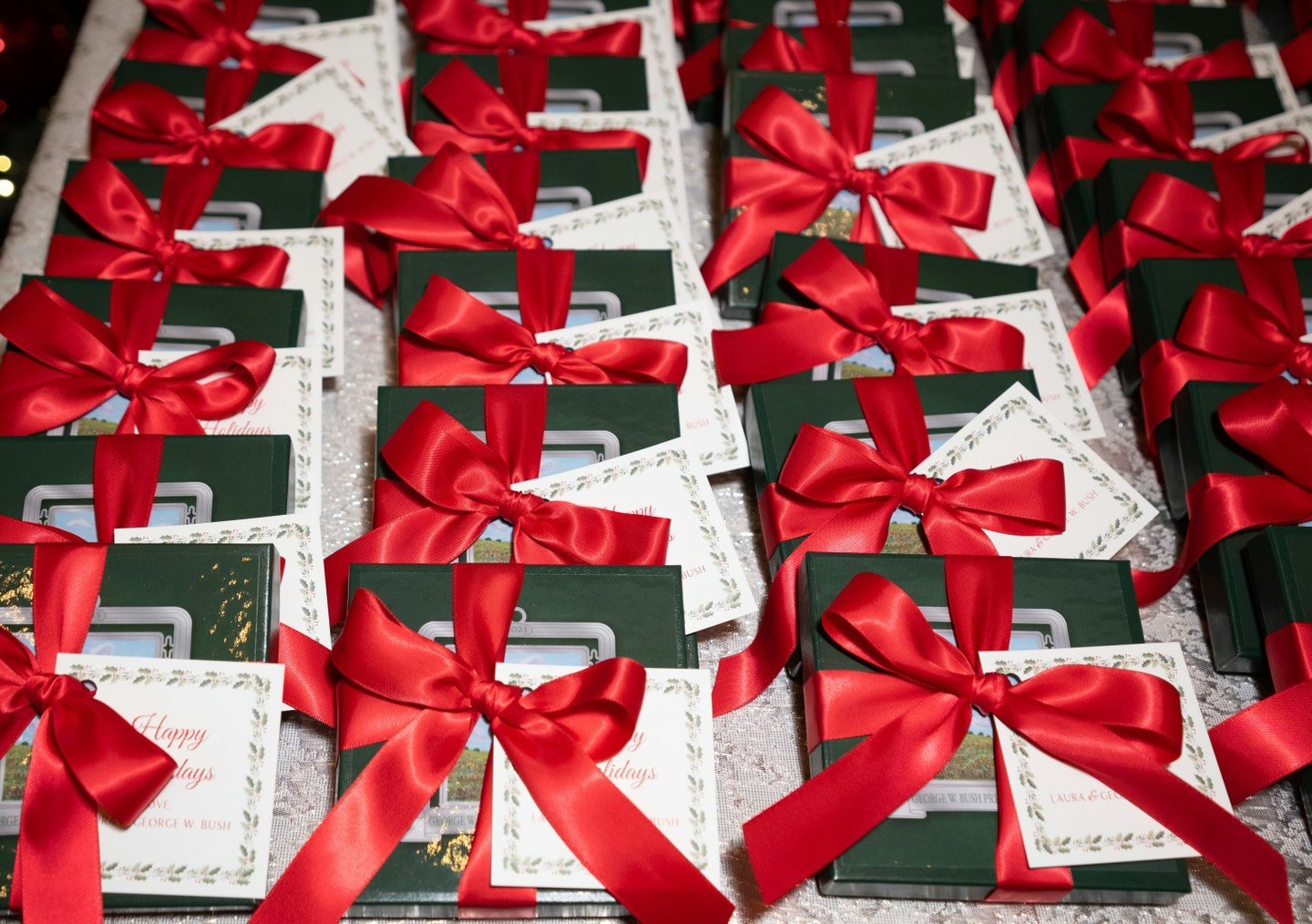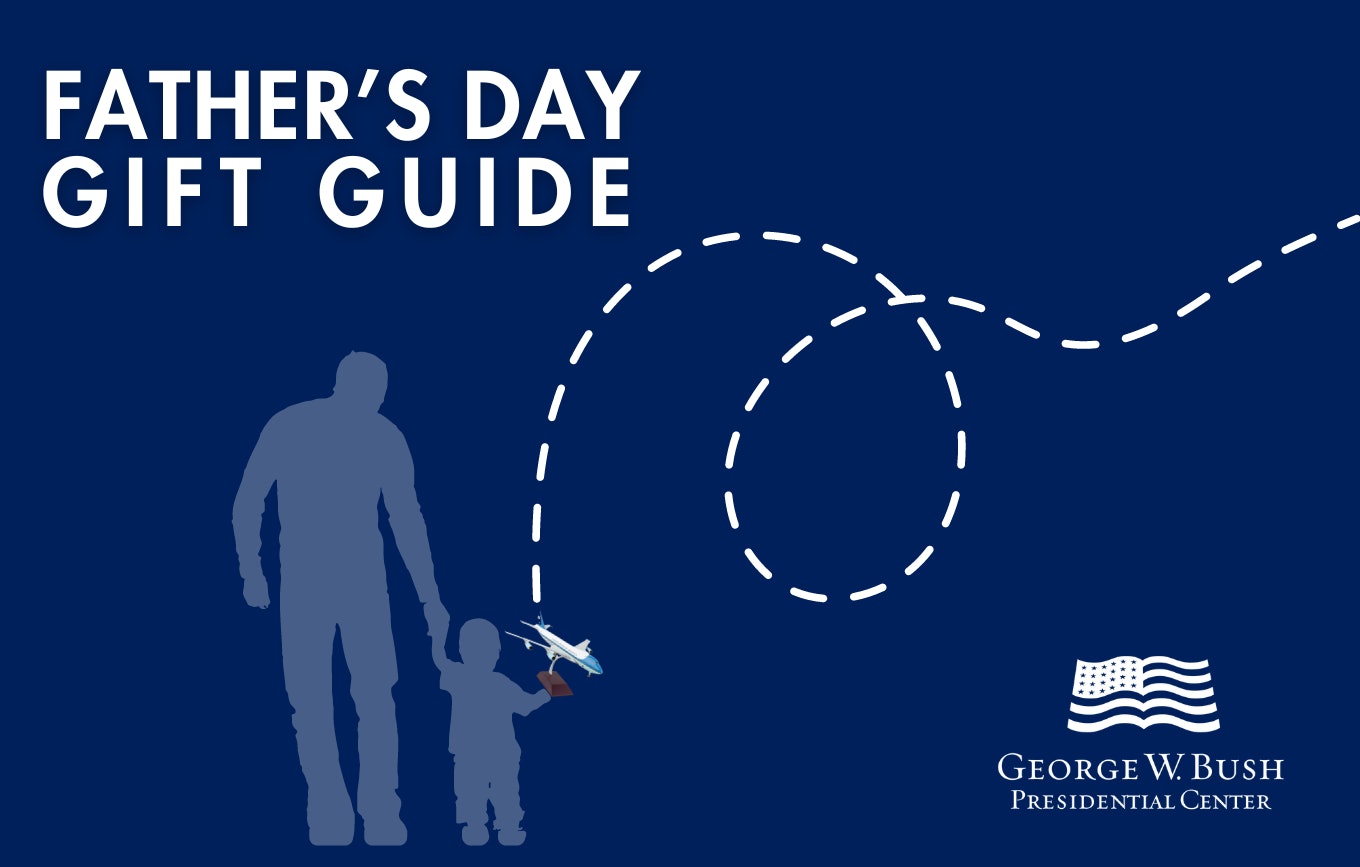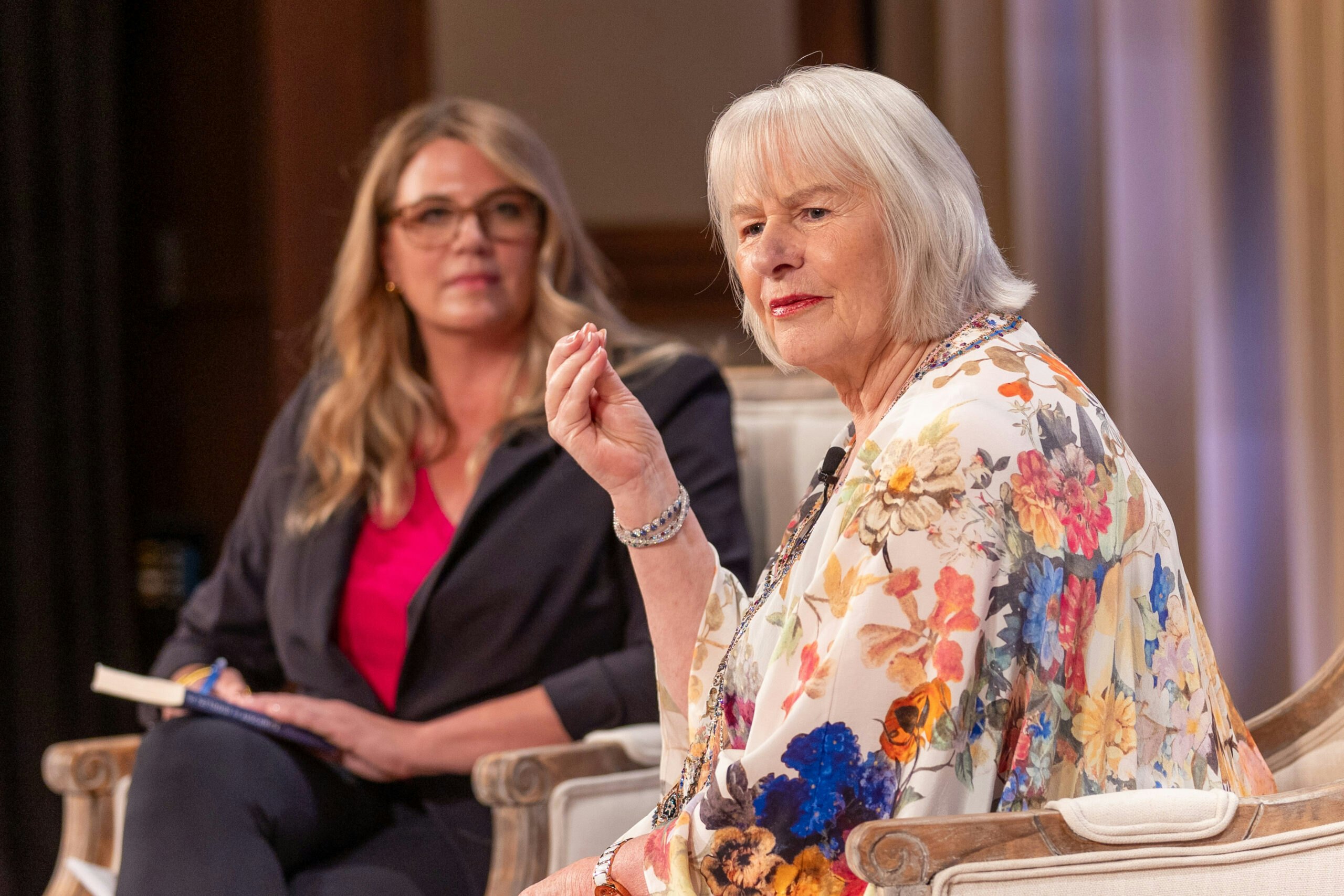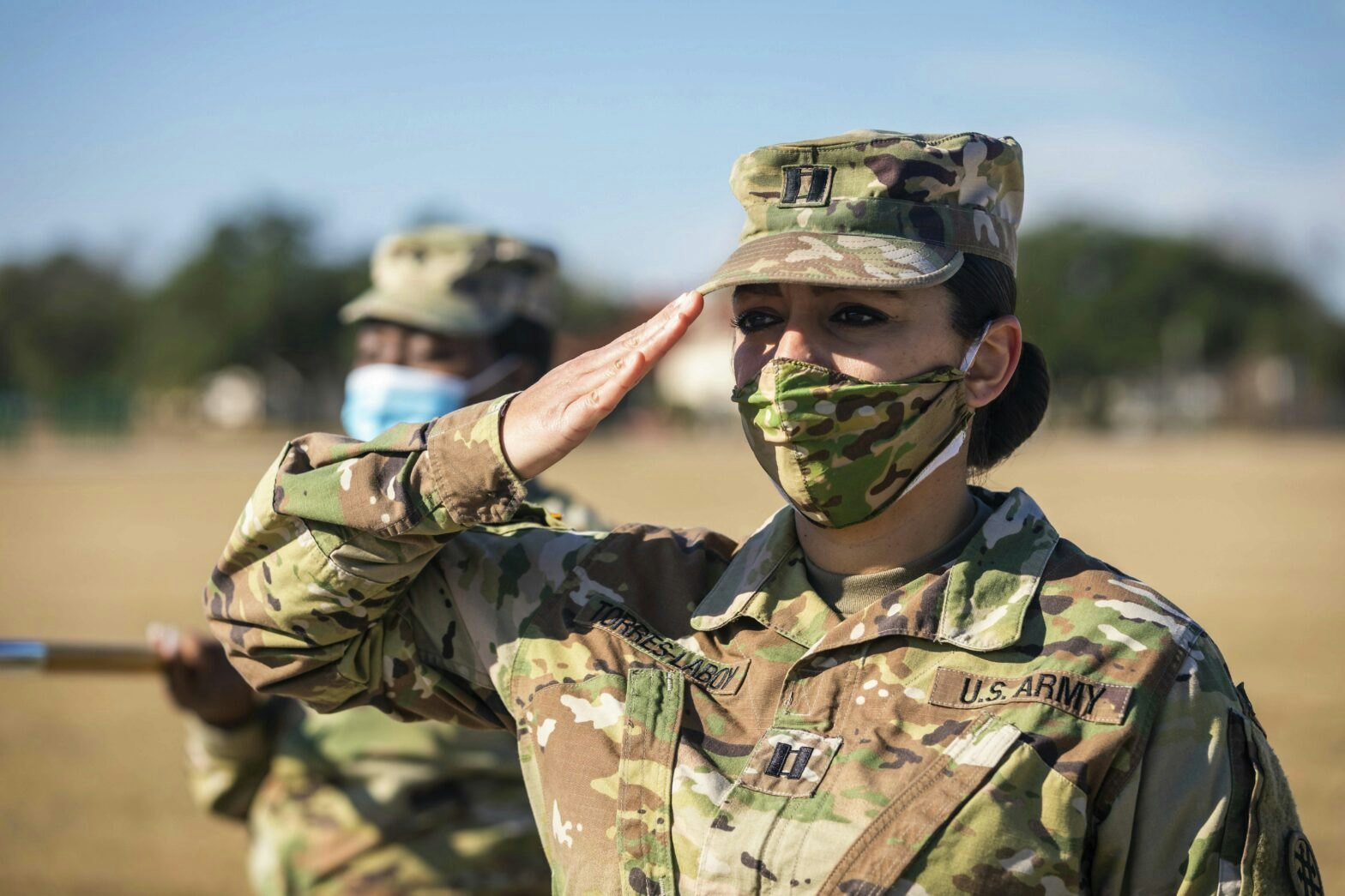“His fingerprints are all over every aspect of my life.”
On May 25, Ashley Hickey Marquis (EOP, OGWB), who served as Special Projects Coordinator in Oval Office Operations from 2007-09, moderated a 43 Club event at the Bush Center with Josh Deckard (White House Press Office), Elizabeth Hogan Parrott (Campaign, White House PPO, DoC), and David Sherzer (HUD, White House Staff Secretary’s Office and Oval Office Operations, OGWB). Rather than “Five Questions With…” this month, we’re highlighting two questions and seven thoughtful (and at times, entertaining) answers from their conversation. The content has been edited for brevity and clarity.
Q: How did President Bush’s leadership influence you as a person?
Deckard: There were so many young guys that are lifelong friends that I met during my time in the White House. And something I talk about often with a few of them is that he really influenced every aspect of our lives – my faith, my marriage, my parenting, my friendships, how I think about loyalty, how I think about service. One of the things that President Bush said over and over is … “to whom much is given, much is required”. When I left the White House, I wrote him a note that said, most people are either the same in public as they are in private, or they come across better in public than in private, and he’s the first person in my life who ever came across in private, infinitely greater than anybody could ever imagine. His fingerprints are all over every aspect of my life, for sure.
Elizabeth Hogan Parrott: The most memorable thing that stands out to me is (that) everybody wanted to do their very best because of who the leader was. And just the humbleness, the integrity, it was hard not to love him, and you just wanted to do your very best. That was very much apparent in the way his administration was run. It was run very well because everybody wanted to do their very best. This is more business oriented, but just knowing to re-read things 1,000 times and make sure the period is in the right place and the space is in the right place. And take pride in your work and what you’re giving, even if it’s not going to the President of the United States, but just going to your boss. You want it to look good, and you want it to make sure that you double check things and that it’s succinct. The work ethic was just energized. The dedication (of the staff) was just something very memorable.
David Sherzer: I would say a lot of things, but his faith, certainly has had the most important impact on me. It’s not something he necessarily wears on his sleeve, in terms of talking about all the time, but he has talked about it. When I worked in Oval Office operations, and then in my subsequent jobs, it was a more challenging time during the presidency, and yet, he was kind of steady as you go, he was always very joyful, and it wasn’t this kind of fake, I need to put on a good face for everybody just so they don’t, you know, lose it. He was genuinely very secure and very joyful. And over time, I really came to realize that it was because of his faith in Jesus, that he knew he was secure in his identity. His identity wasn’t in the polls, it wasn’t in what people were saying about him. It was in being loved by the Lord. That influenced me to eventually become a Christian in 2009. There’s a saying, “preach the gospel, always, but with words, if necessary,” and he kind of lives that out every day behind the scenes, and in the way he deals with people, even publicly. He’s just got a lot of integrity. I think his faith (is) a big part of what made him such a great leader.
Ashley Hickey Marquis: (What’s) popping into my mind is something that he made possible for myself and a couple other members of the staff and it was around the Pope’s visit in 2008. The Vatican is very specific about how many hands he shakes and who those people are. And, as you can imagine, it’s usually the most senior people in the administration. Everyone is vying for their chance to meet him. President Bush knew that I was Catholic, as well as his secretary, Karen Keller and the two Oval Office stewards who are in the Navy and helped him throughout his day with food and other things that he might need. And so, the Pope’s there, and they go into the Oval Office for their meeting. There’s a little peephole that we were able to kind of see what was going on in the Oval Office, and then all of a sudden, the door opens, and President Bush says, “Come on in.” He had asked the Pope if it’s okay to bring in Karen, Ferdie and Ed, who were the two Oval Office stewards and myself to have a private audience with the Pope. And I bring that up just because it reflects so much on who (President Bush) is, that in such a momentous meeting, somehow he had the presence of mind to think about us. And I would say that’s also how he influenced me the most is just trying to be mindful of things like that – how you can try to make someone else’s day better, do something for somebody that’s not expecting it. I was only 21 when I started working for him. It’s such a formative time in your life. It really is his fingerprints, as Josh put it, all over so many aspects of my life.
Q: What was it like to work in the White House in your early ‘20s?
Deckard: There’s nothing like that first day walking in. Although every day working in the West Wing, it’s just mind blowing. I mean, one day, you’re washing your hands next to Bill Gates. And the next day, you’re in the Oval Office with Vladimir Putin. And then you’re asked to make photocopies. There’s just no job in the world that can equate. But the thing that really stood out to me from day one, was how humble everyone was. And obviously that starts with the President. I was really fortunate – Andy Card was the Chief of Staff at the time. This is a guy who answered his own phone and would take White House operators to lunch to make sure that people were treating them well. I got to learn from really wonderful, humble people. But the thing that I continued to see in my time there was the higher or more important, somebody was on the totem pole the more considerate it seemed like they were to others. As somebody starting out, not really understanding how the world works, and being surrounded by people who were the best in the world at what they do, and watching how they treated people is just absolutely incredible. President Bush did a really great job at the White House and for those of us who were able to travel (to) build this amazing camaraderie, and there was humor. We’re dealing with very serious things around the world, and he obviously took this job very seriously, but he always incorporated humor into everything that we were doing, which, when you’re working long, hard days traveling to multiple countries and sometimes multiple continents in the same day, really kept people going.
Sherzer: (It’s) definitely something to do in your 20s when you have a lot of energy and don’t need a lot of sleep. President Bush was very much of a morning person. He would get to the office around six o’clock. The more closely you worked with him, the more it was imperative that you, too, are a morning person. Fortunately, I am. We would get there very early, you’re working very long hours, it’s kind of a surreal deal because it’s an office, you’re super busy, you’re really, really stressed, but then there’s also people walking around at night taking tours. They’re in the people’s house, and you respect that as well. So, it’s just, it’s a really great place to work, because it teaches you all the traits that he brought to the job as President, in terms of respecting the office, knowing it’s an honor to be there, attention to detail, honesty, integrity, all those things. And so that’s something you can obviously bring forward when you’re gone, because it doesn’t last forever. It’s a good thing to have done in your 20s. And I don’t know how you could do it when you’re not in your 20s, but people do.
Hogan Parrott: I’m very thankful, because there really is no reason I should have been able to experience all that. (You’d be) working on whatever you’re working on, and then they would say, okay, you need to walk across the street to the South Lawn and come to this event. And the first state arrival event was Vincente Fox, the president of Mexico at the time. It just is a very unique and very humbling place to work. Another fun thing that happened in the early days with President Bush, we did a 5k. As a staffer, you were able to sign up, and we ran this 5k with him. I still have the printout of the race times. President Bush did not come in first. I think he came in top 20. It’s fun to see people on there that you know. I think I was four minutes behind him or something. I think he ran (it) in 20 minutes. I was (recently) speaking to David Hill. He worked in PPO with me. I looked at the list, and (said), you had a better time than President Bush. He said, “yeah, I remember. He was right behind me. I’m trying to think if I should slow down and let him win.”





